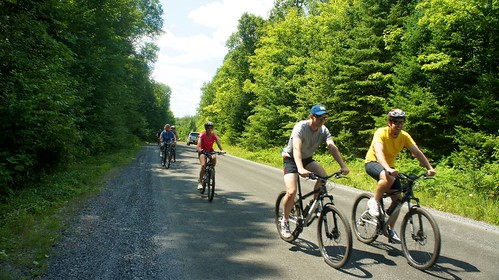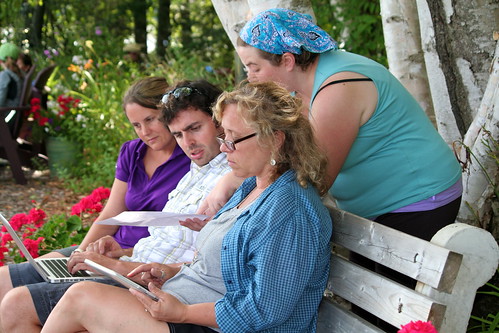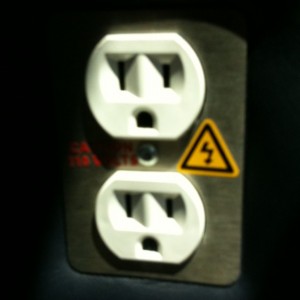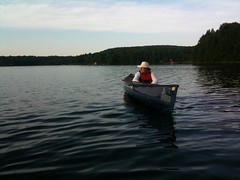by Andrew Forgrave and Kim Crawford
Central to Unplug’d was the notion of leaving the Internet behind. Various thoughts on connecting, unplugging, and focusing attention have started to emerge.
What did it feel like to unplug?
Kim: I didn’t have far to go from ‘plugged’ to ‘unplugged’. I scaled back my online presence a year ago. Since then it has been sporadic; I lurked, but rarely participated. For me, unplugging was only difficult in that I couldn’t text with my teenage children or search for information online (which I do a lot).
Andy: If I have the time, I tend to be online, keeping tabs on conversations that occur at all parts of the day. So while I was fully prepared to unplug, I found myself wrestling with how to choose the right time. In part, I was observing others to see how they would handle the transition to disconnect. With other folks posting to Twitter on the train north to The Edge, there was an interest in participating in the recording/telling of “the departure story.” However, upon arrival at South River, there was a great flurry of activity, and a while thereafter, about halfway through the 22 km bike ride to The Edge, I simply realized I would turn off my phone to conserve its charge. I was unplugged.
How did being unplugged shape your experience and interactions with people?
Kim: I was present and focused on the moment, so I fully embraced and engaged in the experience. At The Edge, I think we were able to practice mindfulness, without the distractions of news, people and information from outside of our Unplug’d circle. Throughout our formal and informal conversations, we listened to what people’s eyes conveyed. We listened to gestures and body language. We listened to the emotion in a wavering or cracking voice that we wouldn’t hear, couldn’t hear, in a tweet, and we were there to place a comforting hand on a shoulder. We couldn’t hide behind online personas, so we exposed ourselves for who we are. We accepted each other for who we are. And, with the focus on connection, we couldn’t help but ask “what is my connection? What can I offer?” We formed deeper relationships by removing the barriers of time, space and pretense.
Andy: Without devices buzzing in my pocket, supported by the hyper-natural setting of The Edge, and with real-live friends front and centre, awareness of the Internet melted away. Maybe I shifted into a former at-camp mode (years ago, working at summer camp for weeks at a time, the only news came in the form of a newspaper — which I ignored). At Unplug’d, without phones or Internet, we worked with primitives: paper & pens, even markers, paints, rocks and stone. And canoes. Without distractions of plugged-in life, conversations went deep. Really deep. These are experiences that just can’t happen online. Internet? We didn’t need no stinkin’ Internet.
How did you react to the ability to plug back in?
Kim: After sending some texts to my children, it was all about the pictures and the conversation. We were still together on the bus when we could plug back in, so it was a group share out to those who weren’t at The Edge. I wanted to tell a part of the story, so I used my pictures. I started editing them and planning captions. I uploaded everything on the train from Toronto to London.
Andy: As with “the departure” from Toronto, I was interested in observing our collective response to “the return,” and the opportunity to plug-in. It came as a shock to me to discover that there would be WiFi on the return bus. I somehow felt as if nature was testing us, to see if we had learned a lesson — or not. I avoided the immediate temptation to check what was being shared on Twitter. In my head I was hearing, “I have four more hours to connect with these people face-to-face.” And I’m glad I did.
The next day back, however, after some time spent sleeping, presented the opportunity to continue conversations with Unplug’d delegates as they travelled home. And that meant being online. And online I was. Looking to carry on the discussions that we hadn’t had time to finish. Looking to make plans for future projects. Caring for new friends who were now getting further and further away. And not wanting Unplug’d to end.
How did being (at) unplug’d inspire you?
Kim: I will make more of an effort to be connected both online and off. In order to do this, I’ve generated these reminders for myself:
- Listen first
- Stay open to people
- Don’t be afraid to speak your truth, but share it with kindness
- Participate online
- Keep moving forward even if you don’t know what the path or destination look like
- Join forces
Andy: Unplug’d was an inspiration in many ways. With regards to the connected/disconnected tension, Unplug’d was a wonderful reminder of the benefits of stepping away from day-to-day routines to renew connections with things we overlook in our busy lives. So I’m going commit to continue to unplug; to break the habit of continual online connectedness. I do know that there’s an issue of balance in here. Too little connection and the conversation gets lost. But the other conversation is important, too. The Unplug’d experience made that very clear.
We’d like to hear from you.
What does it feel like to unplug? How does being unplugged shape your experiences and interactions with people? How have you reacted to the ability to plug back in? How has being (at) unplug’d inspire you?






